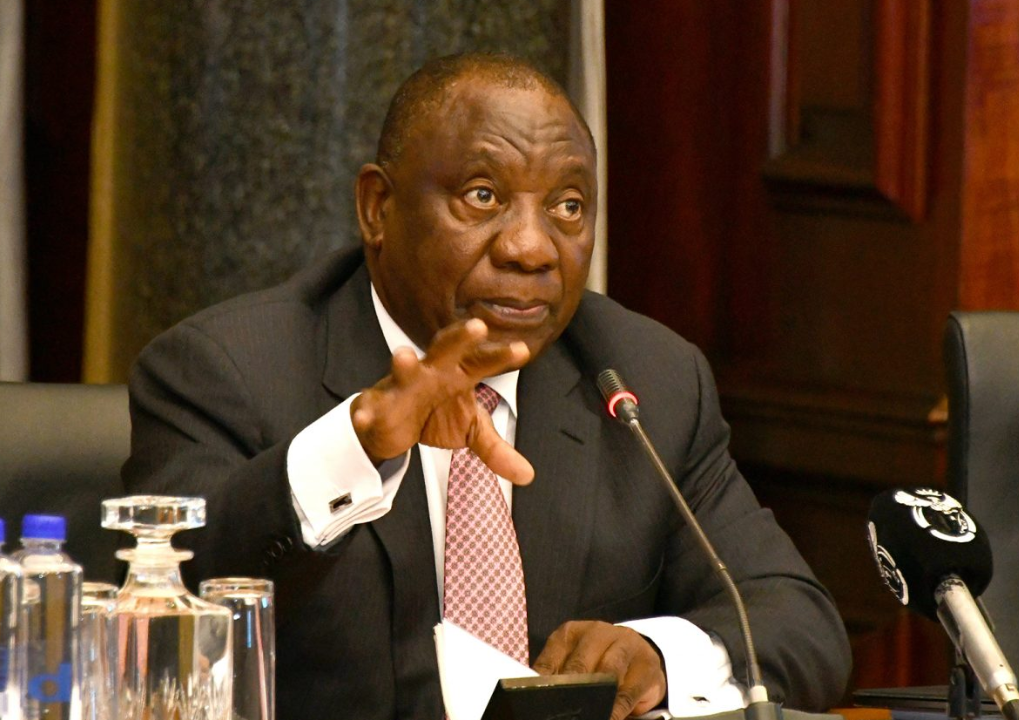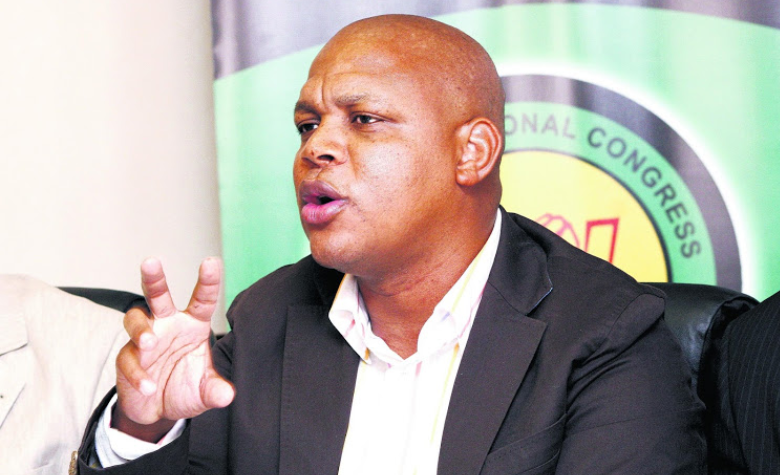This situation calls for an extraordinary response; there can be no halfmeasures.
Cabinet held a special meeting earlier today.
After which, due to the serious measures we are going to announce, I have
consulted the premiers.
We have decided to take urgent and drastic measures to manage the
disease, protect the people of our country and reduce the impact of the
virus on our society and on our economy.
We have now declared a national state of disaster in terms of the Disaster
Management Act.
This will enable us to have an integrated and coordinated disaster
management mechanism that will focus on preventing and reducing the
outbreak of this virus.
We will also be able to set up emergency, rapid and effective response
systems to mitigate the severity of its impact.
Following an extensive analysis of the progression of the disease
worldwide and in South Africa, Cabinet has decided on the following
measures:
Firstly, to limit contact between persons who may be infected and South
African citizens
We are imposing a travel ban on foreign nationals from high-risk countries
such as Italy, Iran, South Korea, Spain, Germany, the United States, the
United Kingdom and China as from 18 March 2020.
We have cancelled visas to visitors from those countries from today and
previously granted visas are hereby revoked.
South African citizens are advised to refrain from all forms of travel to or
through the European Union, United States, United Kingdom and other
identified high-risk countries such as China, Iran and South Korea.
This is effective immediately.
Government will continue to regularly issue travel alerts referring to specific
cities, countries or regions as the situation evolves based on the risk level.
Any foreign national who has visited high-risk countries in the past 20 days
will be denied a visa.
South African citizens returning from high-risk countries will be subjected to
testing and self-isolation or quarantine on return to South Africa.
Travellers from medium-risk countries – such as Portugal, Hong Kong and
Singapore – will be required to undergo high intensity screening.
All travellers who have entered South Africa from high-risk countries since
mid-February will be required to present themselves for testing.
We will strengthen surveillance, screening and testing measures at OR
Tambo, Cape Town and King Shaka International Airports
South Africa has 72 ports of entry in the country which are land, sea and air
ports.
Of the 53 land ports, 35 will be shut down with effect from Monday 16
March.
2 of the 8 sea ports will be closed for passengers and crew changes.
Effective immediately, all non-essential travel for all spheres of government
outside of the Republic is prohibited
We further discourage all non-essential domestic travel, particularly by air,
rail, taxis and bus.
Secondly, it is essential therefore that we minimize the risk of the spread of
this virus by limiting contact amongst groups of people.
While we appreciate the economic, religious, and cultural significance of
social and community gatherings, the coronavirus is spread through
contact between persons.
As we have said before, the current circumstances require extraordinary
measures to curb the spread of infections. Countries that have heeded the
call to implement these radical measures, have fared much better than
those than do not.
Therefore to encourage social distancing Cabinet has decided on these
additional measures:
Gatherings of more than 100 people will be prohibited.
Mass celebrations of upcoming national days such as Human Rights Day
and other large government events will be cancelled.
Where small gatherings are unavoidable, organisers will need to put in
place stringent measures of prevention and control.
Schools will be closed from Wednesday, 18 March, and will remain closed
until after the Easter Weekend.
To compensate, the mid-year school holidays will be shortened by a week.
Government is working closely with colleges, universities and other public
facilities such as Parliament, prisons, police stations and military
installations to intensify hygiene control.
Visits to all correctional centres are suspend for 30 days with immediate
effect.
Government is aware of the confirmed case of a student who has tested
positive for the coronavirus at Wits University.
Those who have been in contact with the student will be quarantined.
The Minister of Higher Education, Science and Innovation is consulting with
vice chancellors of universities and colleges across the country and will
soon be announcing measures in this regard.
We call on all businesses including mining, retail, banking, farming to
ensure that they take all necessary measures to intensify hygiene control.
We also call on the management of malls, entertainment centres and other
places frequented by large numbers of people to bolster their hygiene
control.
Thirdly, to further strengthen our health response:
Government is strengthening its surveillance and testing systems.
We are in process of identifying isolation and quarantine sites in each
district and metro.
Capacity is being increased at designated hospitals in all provinces.
We are also increasing the capacity of existing contact tracing processes.
We are partnering with the private sector to set up a national tracking,
tracing and monitoring system of all people infected with the coronavirus
and those they have been in contact with
We are undertaking a mass communication campaign on good hygiene
and effective prevention behaviour.
Therefore, we are calling on everyone to:
• Wash their hands frequently with soap and water or hand sanitisers for at
least 20 seconds;
• over their nose and mouth when coughing and sneezing with tissue or
flexed elbow;
• Avoid close contact with anyone with cold or flu-like symptoms.
In essence, we are calling for a change of behavior amongst all South
Africans.
We must minimise physical contact with other people, and, encourage the
elbow greeting rather than shaking hands.
Because of the severity of this virus and its rapid spreading, government
will make funding available to capacitate the sectors dealing with the
national response to the Coronavirus outbreak.
Since the outbreak of this pandemic, our government’s response has been
led by an Inter-Ministerial Committee, chaired by the Minister of Health, Dr
Zweli Mkhize.
We congratulate them on the outstanding work they have done – together
with their able support teams – to steer our country through this challenging
and un-certain period.
As part of the intensification of this effort, we have decided to establish a
National Command Council chaired by the President.
This Command Council will include, amongst others, members of the InterMinisterial Committee and will meet three times a week, to coordinate all
aspects of our extraordinary emergency response.
My fellow South Africans,
In addition to the impact that this pandemic will have on health and wellbeing of our people, and the impact it will have on the day-to-day life of our
society, COVID-19 will also have a significant and potentially lasting impact
on our economy.
In the last few weeks, we have seen a dramatic decline in economic activity
in our major trading partners, a sudden drop in international tourism and
severe instability across all global markets.
The anticipated effects of the decline in exports and tourist arrivals will be
ex-acerbated by both an increase in infections and the measures we are
required to take to contain the spread of the disease.
This will have a potentially severe impact on production, the viability of
businesses, job retention and job creation.
Cabinet is therefore in the process of finalising a comprehensive package
of interventions to mitigate the expected impact of COVID-19 on our
economy.
This package, which will consist of various fiscal and other measures, will
be concluded following consultation with business, labour and other
relevant institutions.
It is clear that this disease will be extremely disruptive.
Our priority must be to safeguard the health and well-being of all South
Africans, to minimise the number of infections and to ensure all those
infected get proper treatment.
While we are battling a contagious virus, perhaps the greatest dangers to
our country at this time are fear and ignorance.
We must appreciate the extent of the threat that this disease presents, we
must accept the anxiety that it causes, but we cannot allow ourselves to be
overwhelmed by fear and panic.
We should stop spreading fake and unverified news and create further
apprehension and alarm.
While we are facing a medical emergency far graver than we have
experienced in recent times, we are not helpless.
We have the knowledge, the means and the resources to fight this disease.
If we act swiftly, with purpose and collectively we can limit the effects of the
coronavirus on our people and our country.
Although we may be limiting physical contact, this epidemic has the
potential to bring us closer together.
We are responding as a united nation to a common threat.
This national emergency demands cooperation, collaboration and common
action.
More than that, it requires solidarity, understanding and compassion.
Those who have resources, those who are healthy, need to assist those
who are in need and who are vulnerable.
All the institutions of the state will be mobilised to lead this effort, but, if we
are to succeed, every company, trade union, NGO, university, college,
school, religious group and taxi association will need to play its part.
We thank those people who suspected they may have been exposed to the
virus for coming forward to be tested and for taking measures – such as
self-isolation – to prevent further transmission.
We thank the medical teams around the country who are leading our
response and are putting the well-being of others ahead of the risks they
face themselves.
On Saturday we welcomed 104 of our compatriots who were in Wuhan City,
China.
We thank the repatriation team for the task they performed with pride and
efficiency to return them to the country and ultimately to their families.
The repatriation has been successful and those who have returned have
settled in the quarantine area.
We thank the military health officials, pilots, cabin crew and all those who
participated in this exercise.
We thank the leadership and the people of Polokwane and Limpopo for
warmly welcoming our fellow South Africans.
We also extend our gratitude to the staff and management of the Ranch
Hotel who have accommodated our compatriots and also subjected
themselves to quarantine.
We extend our appreciation too to the companies, organisations and
individuals who have taken it upon themselves to disseminate information
about this virus and to raise awareness.
We thank those businesses that have taken steps to protect their
employees, and those unions that have taken steps to protect their
members.
Ministers who are at the frontline of coordinating our response to this crisis
will be briefing the nation tomorrow, where they will unpack details in
relation to the measures we announced tonight.
Fellow South Africans, this is the most definitive Thuma Mina moment for
our country.
I have great trust that our people will respond positively to this call to
common action.
Fellow South Africans,
This epidemic will pass.
But it is up to us to determine how long it will last, how damaging it will be,
and how long it will take our economy and our country to recover.
It is true that we are facing a grave emergency.
But if we act together, if we act now, and if we act decisively, we will
overcome it.
I thank you.










